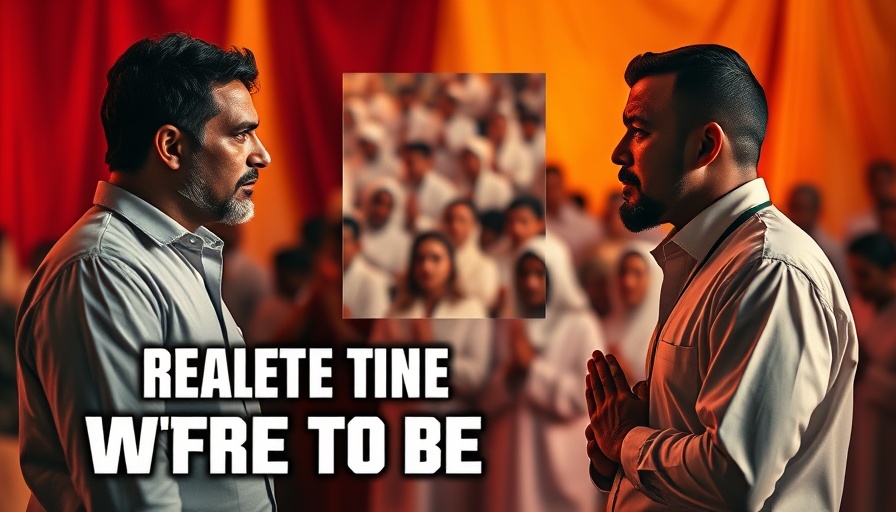
Incredible Reports: Muslims Encountering Jesus in Dreams
In a time of great theological and cultural divides, stories emerging from the Middle East reveal a surprising phenomenon: a growing number of Muslims are claiming to have dreams and visions of Jesus. This grassroots awakening, documented by individuals like Tom Doyle, illustrates how divine encounters are reshaping spiritual paths and challenging established beliefs.
In 'Are Muslims Encountering Jesus? A Surprise Awakening,' this discussion dives into the phenomenon of Muslims having dreams of Jesus, exploring key insights that sparked deeper analysis on our end.
What Are These Experiences?
Predominantly in Islamic nations, accounts have surfaced of individuals reporting dreams in which a figure, often described as a man in a white robe, calls them to follow Him. These scenarios have led many to accept Christianity, stating that they experienced something profound and transformative.
As reported in interviews, one woman revealed she had been living in fear under the harsh conditions of her relationship, marked by domestic violence. After an earnest plea for divine intervention, she encountered Jesus in a dream, who reassured her of His love and provided a path to safety. Stories of this nature are growing increasingly common among communities historically resistant to the Christian message.
Changing Hearts and Minds: The Role of Spiritual Encounters
Surprisingly, many of those experiencing these dreams were not actively seeking faith but found themselves short of hope. In desperation, they prayed for God to reveal Himself, and what followed was often a vivid and unforgettable dream. This aligns with a prevalent belief within Islam that God can communicate through visions, particularly during significant periods like Ramadan, further opening faith explorations.
Interestingly, Muslims in the West have also begun to share similar claims. For instance, in Dallas, an encounter led to a Muslim woman discovering that she had been having dreams of Jesus for decades, ultimately leading her to a church where she was welcomed and could ask questions about her visions. Those living amidst diverse faith backgrounds have the potential to create dialogue that can bridge understanding and foster connection.
The Impact of Media: Sharing Testimonies
The rise of digital media has facilitated the dissemination of these experiences. Initiatives like “I Found The Truth” have garnered global interest, showcasing testimonies from former Muslims expressing the life-changing power of their dreams. One staggering statistic mentioned is that a Muslim outreach website received nearly 750,000 responses from individuals claiming similar experiences.
In a world saturated with differing doctrines, these testimonies resonate deeply. They reflect a shared search for hope, purpose, and understanding of Jesus, who is presented in the Quran as a significant figure but not the Messiah. The challenge remains how these narratives can be interpreted in the context of existing theological frameworks, particularly if some claim that these dreams are misleading or demonic.
Addressing Criticism and Challenges
Academic and theological challenges arise, with some skeptics arguing that these experiences can stem from cultural narratives or even psychological influences rather than genuine divine encounters. However, proponents like Doyle argue that the sheer number and consistency of experiences across diverse demographics suggest a profound movement of God rather than mere coincidence.
Furthermore, Doyle emphasizes the importance of approaching these discussions with love and understanding. By sharing these miracle accounts and framing them within the kindness of Jesus, believers may find unexpected opportunities to talk about faith with Muslims who might otherwise be closed to such discussions.
Encouraging Open Dialogue: A Call to Action
As believers, it is crucial to recognize and support the ongoing conversations centered around these dreams. Engaging with Muslims about their experiences and providing a safe space for inquiry could establish fruitful dialogues that trace back to biblical truths.
For those interested in learning more about these events and embracing this unique moment in history, consider sharing these stories within your church and discussing opportunities for outreach. Could these dreams illustrate a divine invitation to bridge gaps of misunderstanding, leading to a greater unity in faith?
In a landscape where fear often dominates, these shared miracles of faith serve as a powerful reminder of Jesus’ willingness to connect with humanity. By fostering courage, empathy, and open-mindedness, perhaps there’s a way forward for all to encounter the love that transcends religions, cultures, and personal struggles.
 Add Row
Add Row  Add
Add 








Write A Comment